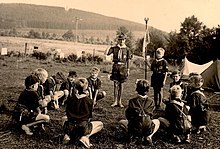Wolfling
The term Cub Scouts (in Switzerland Wolves ) referred to in the Scout Movement , the age of the most seven to eleven year old children .
method
The jungle books by Rudyard Kipling form the basis of the wolf's work . Like Mowgli in the wolf pack, the child is included in the group of wolves (usually also referred to as pack or pack) and has to find its way there first. Later on, they are given smaller tasks in the group, help other children to acclimatise and eventually have to leave their pack when they switch to the Boy Scout level - just as Mowgli leaves his pack to return to the human world.
Numerous terms and events from the jungle books were integrated into the work of the wolves or form the basis for the rituals used there . The local group of wolves (mostly 15 to 30 children) is known as the “pack”, which in turn is divided into “packs” of 6 to 10 children. The group leader is often called Akela , based on the leader wolf , other group helpers are called Baghira , Balu or Hathi . Before the mostly solemn change to the clans , the small groups of the Boy Scout level, there is often the "jump over the fire", which builds on Mowgli's conflict with the tiger Shir Khan , after which Mowgli also returns to the world of (adult) people.
In contrast to the strongly action-related learning by doing of the actual boy scout level, playful learning is in the foreground in the work of the wolves . The children are made familiar with their surroundings in a playful way and their skills are developed and promoted in this way. Nevertheless, numerous elements taken from the boy scout method can be found in the work of the wolf, such as the system of the small group or the wolf salute and law (based on the boy scout salute and law ).
history
The Wölflingsarbeit was developed in 1914 by Robert Baden-Powell (BP), the founder of the Boy Scout Movement, because because of the great success of Scouting for Boys and the scout movement that resulted from it, many younger children also wanted to become members of the groups geared towards twelve to sixteen year olds. Baden-Powell received permission from his friend Rudyard Kipling to use his jungle books as the basis for the new working method.

There are various explanations for Baden-Powell's choice of the term Wölflinge ( Wolf Cubs , "wolf boy"), which do not refer to the jungle books:
- The Matabele had given Baden-Powell the name Impeesa ("The wolf that never sleeps").
- “Wolf” was the name of a cannon that was produced in Mafeking 's railway workshops .
- "Wolf" was a name Indians gave their best scouts. A child who is not yet old enough to be a boy scout or a wolf would therefore be a wolf cub or a wolf.
The group of 6- to 8-year-olds was called figli della lupa ("children of the she-wolf") in reference to the legend of Romulus and Remus in the fascist youth organization Balilla , which was founded in Italy in 1926, following the example of the boy scouts .
In German-speaking countries, most of the scout associations did not introduce wolfling work until after the Second World War .
Gnome
In Austria the story of Inge Peter is the basis for the work with girls; Girls are referred to as Wichtel in these associations, but also partly in German ( see also: Brownie (mythology) ). This gnome story is about the gnome girl Amona (ie "The lovely one"), who loses her name because of her sometimes mean pranks and is now to be called "Puck" (name for an earth spirit) in the Waldenland. After surviving several adventures and proving her good heart, she finally gets her name back, Amona.
Bienli
In the Swiss Scout Movement , girls of this age were called "Bienli" or "Beieli" (little bees ) until 2010 . The togetherness of the bee colony and the hard work of the bees should be particularly emphasized. Their greeting was similar to the wolf greeting, only that the two fingers that symbolize the ears are held together to show the cohesion. Since the age groups were redesigned in 2010, girls have also been referred to as "wolves". The girl scouts and girl scouts of Liechtenstein continue to use the term “Bienle” for the youngest female members, but work exclusively with the jungle book.
Web links
- History and basics of wolfling work (English)